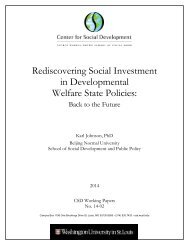Exploring and Assessing Intercultural Competence - Center for ...
Exploring and Assessing Intercultural Competence - Center for ...
Exploring and Assessing Intercultural Competence - Center for ...
Create successful ePaper yourself
Turn your PDF publications into a flip-book with our unique Google optimized e-Paper software.
<strong>Exploring</strong> <strong>and</strong> <strong>Assessing</strong> <strong>Intercultural</strong> <strong>Competence</strong><br />
Indeed, volunteers reported that they learned important life skills: open-mindedness, appreciation<br />
<strong>for</strong> others, a deeper level of self knowledge, new perspectives, language skills, confidence,<br />
communication, observation skills, a non-judgmental attitude, patience, underst<strong>and</strong>ing, reasoning,<br />
self-development, <strong>and</strong> independence. In the end, all respondents indicated some degree of<br />
progress in each area.<br />
A Hierarchy of Attributes?<br />
It seems possible that attributes might be arranged hierarchically in terms of descending or<br />
ascending importance; that is, some factors may contribute more than others to IC success. It also<br />
seems possible that some attributes may overlap <strong>and</strong> could be consolidated. The survey <strong>for</strong>m, of<br />
course, did not list attributes in any particular order of importance nor has the intercultural<br />
literature provided any hint of a hierarchy of attributes. On the other h<strong>and</strong>, it might be interesting<br />
to quantify the number of times attributes were cited by respondents – both alumni <strong>and</strong> volunteers<br />
– in open-ended sections of the survey <strong>for</strong>m <strong>and</strong> in interviews.<br />
Be<strong>for</strong>e attempting to organize attributes in terms of frequency of citation, a cluster analysis would<br />
be required. Clearly some terms are synonymous or might overlap in their spheres of meaning.<br />
An initial cluster, <strong>for</strong> example, might be: “openminded, positive attitude, acceptance” or<br />
“language, communication,” in which cases items could be grouped together. Following this line<br />
of thought, here are the results in order of frequency (original attributes from the list are cited in<br />
bold; additional qualities cited by respondents are not):<br />
- openminded, positive attitude, acceptance, tolerance (26)<br />
• people, places, sights, <strong>and</strong> sounds<br />
• willing to absorb the culture<br />
• willingness to learn<br />
• willingness to try new things (2)<br />
• willingness to interact with people<br />
• be prepared not to dem<strong>and</strong> one’s own st<strong>and</strong>ards<br />
• not questioning why (acceptance)<br />
• accept differences<br />
• don’t expect too much of yourself too soon (a gradual process)<br />
• don’t take one’s own culture as a yardstick <strong>for</strong> another<br />
• other cultures not inferior<br />
• take a step back<br />
• can’t change things<br />
• don’t be a missionary<br />
• become like a native to a certain degree<br />
• don’t carry own cultural beliefs abroad<br />
• getting out of one’s own com<strong>for</strong>t zone<br />
• have no expectations (remain open)<br />
- motivation (5)<br />
• motivation is the key<br />
• work hard<br />
• not always fun or a holiday<br />
• lots of work <strong>and</strong> ef<strong>for</strong>t<br />
• take the initiative<br />
<strong>Center</strong> <strong>for</strong> Social Development<br />
Washington University in St. Louis<br />
31
















